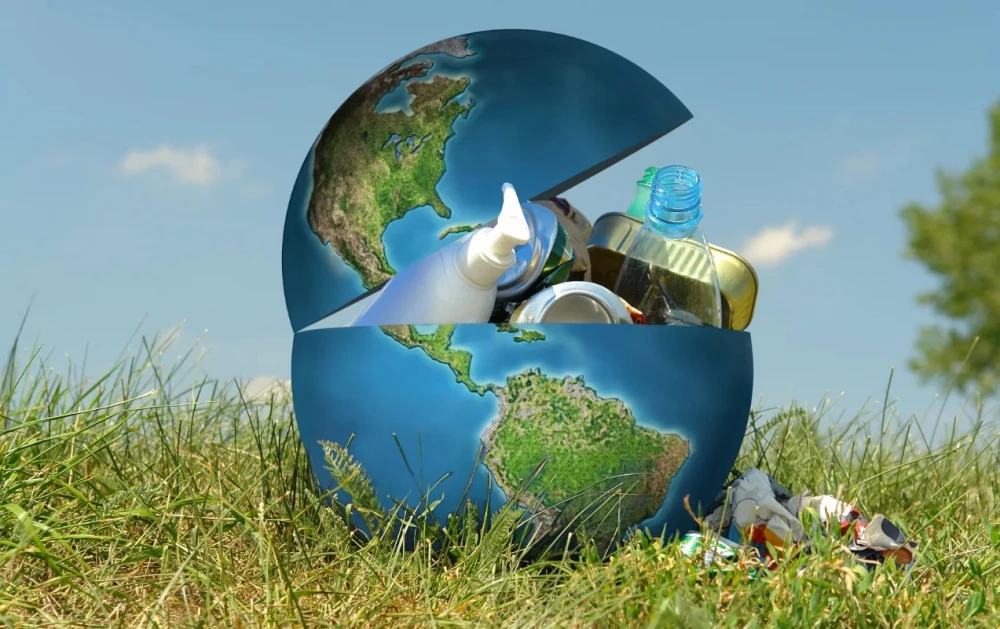
05/06/2023
1664
Under the UN goal to cut plastic pollution by 80% by 2040
Plastic pollution could be slashed by 80% by 2040, according to a new report by the UN Environment Programme (UNEP). Plastic pollution is a scourge that affects every part of the world, from the Arctic to the oceans and the air we breathe. Scientists recently found rocks made from plastic on a remote Brazilian island and there is now so much plastic swirling in parts of the Pacific Ocean that communities of coastal creatures are thriving on it, thousands of miles from their home.
The last few decades have seen plastic production levels soar, especially single-use plastic, and waste management systems have not kept pace. The world generated 139 million metric tons of single-use plastic waste in 2021.
UNEP’s report aims to offer a roadmap to governments and businesses to dramatically cut levels of plastic pollution. It focuses on three main strategies: reuse, recycling, and alternative materials. Reusing plastics would have the greatest impact, according to the report, which recommends promoting options such as refillable bottles, deposit programs to incentivize people to return plastic products, and packaging take-back programs. This would be the most «powerful market shift», reducing plastic pollution by 30% by 2040, the report said.
The new UNEA Resolution, «End Plastic Pollution: Towards a legally binding instrument» establishes an Intergovernmental Negotiating Committee that will develop the specific content of the new plastic pollution treaty with the aim of completing its work by the end of 2024. The future is ours to improve, and this news from UNEA provides a strong message of hope that we can indeed eliminate plastic pollution from our environment with a multi-pronged approach and international cooperation.
The Resolution recognizes that plastic pollution constitutes a threat to all environments and poses risks to human health, and very importantly, the role of the private sector, and all stakeholders, in developing and implementing the treaty, and emphasizes that the problem should be solved through measures along the entire life cycle of plastics, from extraction of raw materials to legacy plastic pollution. A mechanism is included for directing finance to nations to enable the agreement implementation. This can enable countries to implement plastic waste management systems across the life cycle by improving waste collection, building recycling plants, or eliminating the open burning of plastic.
Scaling up recycling levels could reduce plastic pollution by a further 20%, according to the report. Only around 9% of plastics are recycled globally each year, with the rest ending up in landfill or incinerated.
The report also recommends discontinuing the fossil fuel subsidies that help make new plastic products cheaper, which disincentivizes recycling and the use of alternative materials. Fossil fuels are the raw ingredient for almost all plastics. The use of appropriate alternative materials for single-use products, such as wrappers and sachets – including switching to compostable materials that more easily break down – could reduce plastic pollution by 17%, the report found.
«The way we produce, use, and dispose of plastics is polluting ecosystems, creating risks for human health, and destabilizing the climate», said Inger Andersen, UNEP Executive Director, in a statement.
Tackling this will require stricter standards for non-recyclable waste and increasing the responsibility of manufacturers for the impacts of their plastic products, according to the report. The report comes as countries prepare for a second round of negotiations in Paris later this month aimed at agreeing on a world-first international plastics treaty, which would address the whole life of plastics from production to disposal. Whether the treaty will include curbs on plastic manufacturing remains a sticking point.
Our country recognizes the importance of the protection of nature and restoration of ecosystems and the urgency of addressing climate change issues in order to achieve sustainable economic development. UNDP is supporting national partners in their efforts to tackle the challenges of plastic pollution through changes in policy mechanisms, introduction of stronger monitoring systems, innovative initiatives and changes in consumer behavior. Much of this work is done as part of the «Sustainable Cities in Turkmenistan: Integrated Green Urban Development» project.
Meylis SADYKOV,
the 3rd year student
of the Faculty of International Journalism
of the Institute of International Relations
of the Ministry of Foreign Affairs of Turkmenistan.


